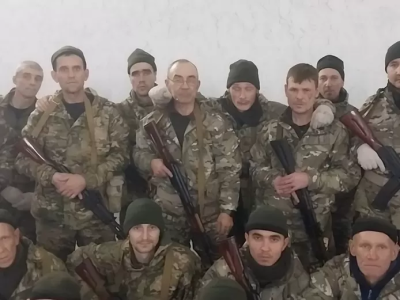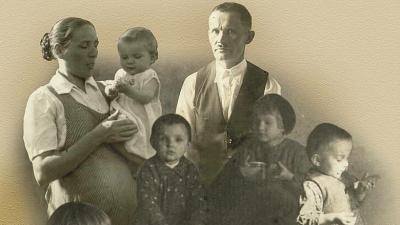“I had been in the colony (prison) for four and a half years when Wagner came to recruit us. They organised a show, arrived in a black Mi-8 helicopter that landed in the car park and drove to the territory of the colony in cars and armed. They took away the guards’ mobile phones, turned off cameras and laptops. They took away the recorders, they blocked everything. They promised pardons and salaries of 200-300,000 roubles a month. They told us that we would be a raiding unit, that only 20-30% of us would come back alive. And that they were looking for bandits, thieves and murderers. The most serious criminal talents. They told us that we would have the opportunity to do everything we were sent to prison for”. This is the account of Mikahil Pavlov, one of the prisoners who was recruited by Wagner but once defected to Ukraine and now fights with the Ukrainians.
The conscription of prisoners is nothing new in Russia; during the Second World War, a million prisoners, except those convicted of “political” reasons and “banditry”, were conscripted into the Red Army. But undoubtedly the most notorious and infamous penal unit was the penal battalion (renamed the SS Grenadier Division, but no larger than a brigade) commanded by Oskar Dirlewanger, which committed all kinds of war crimes, especially during the Warsaw uprising in 1944. When the Russian invasion began in February 2022, Zelensky decided to release prisoners with military experience to join the fight against the Russian forces, a move that was widely criticised at the time by Kremlin propagandists who accused the Ukrainians of “arming criminals”. But, as has been repeated time and again throughout this war, everything Russia accuses Ukraine of, the Kremlin does a thousandfold. If anyone has armed criminals to unprecedented levels, it has been the Russian military.
Indeed, the “Dirlewanger” model found a new organiser in Yevgeny Prigozhin, commander of the “Wagner Group”. Prigozhin was well acquainted with the Russian penal system because, before he became Vladimir Putin’s right-hand man, he was sentenced to 13 years in prison for robbery and theft and spent nine years behind bars. Prigozhin recruited tens of thousands of prisoners and used them in near-suicidal mass attacks against Bakhmut, his greatest victory, but one that bled his private army and pitted him against the Russian army command. The most conservative figures estimate that some 50,000 prisoners were recruited by the Wagner group and then another 15,000 by the Defence Ministry, which has taken over after the Wagner “mutiny” and the assassination of Prigozhin, whose death, the Wall Street Journal reported earlier this week citing Western intelligence sources, was orchestrated by Nikolay Patrushev, secretary of Russia’s Security Council.
In April, Ukraine presented captured documents detailing the organisation of Russian penal units, known as “Storm-Z”, which in addition to conscripted convicts also include soldiers who have committed disciplinary offences such as desertion, drunkenness or disobedience. Ukraine puts their number at more than 150,000 men, many of them involved in war crimes; Ukraine’s Interior Minister Ihor Klymenko said on 22 December that the police have opened more than 105,000 criminal proceedings for war crimes. Of particular significance in this regard is the defection of Igor Salikov, a colonel in the Russian GRU (military intelligence service) and Wagner’s instructor. Salikov, who has served in the Donbas since 2014 and participated in the invasion, left Russia in June this year and flew to the Netherlands from South Africa. The former colonel is ready to testify at the International Criminal Court in The Hague about the war crimes he has witnessed: “false flag operations” in Donbas, atrocities against civilians, torture, execution of prisoners of war and the abduction of children. Yurii Belousov, the chief Ukrainian prosecutor in charge of trying war crimes, has confirmed Salikov’s identity, as he has been cooperating with his prosecution for more than six months: “He gave important testimonies, some of which have already been confirmed, about the invasion of 24 February 2022. He denounced some war crimes, which we are investigating, and some have already been confirmed”.
It is worth mentioning a few examples to show the kind of prisoners who are recruited to fight in the “special military operation” and who, in some cases, have been able to return home after serving their service in Ukraine.
Denis Gorin from Sakhalin was sentenced to a maximum security prison in 2003 for murder and mutilation, but was released in 2010. That same year, he killed again, kept the corpse in his fridge and ate it. With the help of his brother, Gorin killed again in 2011 and in January 2012. In 2017, Gorin and his brother were arrested and sentenced to 22 years in prison. However, the cannibal has not even served five years of his sentence, has been pardoned and has been slightly injured in Ukraine.
Nikolai Ogolobyak, from Yaroslavl, was sentenced to 20 years in prison in 2010 for ritual murder of four teenagers. Ogolobyak led a satanic sect made up of minors who committed the crimes as part of an initiation ritual. According to the files of the first crime, the first two victims were decapitated and then had their hearts and tongues torn out to be devoured. After being recruited to fight in Ukraine, Ogolobyak was seriously wounded in combat and was released in November.
Vyacheslav Samoilov, from Archangel, strangled and dismembered his girlfriend. He was sentenced to 9 years in prison, but served only three months before being sent to Ukraine. He is now free.
Tsyren-Dorzhi Tsyrenzhapov, from Eastern Siberia, strangled an 18-year-old girl, dismembered her and threw her remains into a river. Sentenced to 14 years, he was released after serving in Ukraine. He is the prime suspect in a new murder case.
Ivan Rossomakhin, from Kirov, murdered a man and was sentenced to 14 years in 2020. After returning from Ukraine, he stabbed an 85-year-old woman to death.
In Russia, the release of all these criminals has caused outrage among the families of their victims, who only discover that the killers have returned when they or their neighbours meet them in the street or through social media, but there is no moral boundary that Moscow is not willing to cross in order to get cannon fodder for its “special military operation”. Kremlin spokesman Dmitry Peskov responded to the criticism by stating that “convicted criminals, including serious criminals, pay for their crime with blood on the battlefield”, so there will be no change in the Russian military’s use of prisoners.
Russia has suffered several major setbacks in this war: massive destruction of its armoured units, forcing 60-70 year old tanks such as the T55 or T62 out of storage; Russian aircraft are unable to dominate the skies despite having destroyed Ukrainian air forces four or five times according to Defence Minister Shoigu; the Russian navy is not in control of the Black Sea and its bases are hit again and again; and victories such as Bakhmut come only after months and thousands of casualties. However, Russia still has cannons and, above all, cannon fodder. That is the only trump card that can enable a victory for Putin, provided the West stops supporting Ukraine. Putin announced this month that the Russian army is to increase its strength to 1.5 million troops, an army for attack, and the budget for the war is growing. Does anyone still believe that the objective of this invasion was the Donbas? That Russia will not stop and threaten countries like Moldova, Georgia or any other country where there is an “oppressed” Russian minority? That it will not use hybrid warfare and any other weapon to destabilise its neighbours? The war against Ukraine is not just a regional conflict, it is something much bigger. If the West fails and lets the Ukrainians down, it will not be long before a new conflict begins, ever closer and ever more threatening, and its price will be much higher than what is being paid right now.
Read also
Country Report: Spain & Portugal, March 2023
The political news in Spain in March was marked, much to the chagrin of the mainstream media, by the motion of censure presented by VOX against Pedro Sánchez’s government.
Álvaro Peñas
Bohdan Chuma: “Ukraine’s history is a normal and typical history of a European nation”
Putin is trying to write a history of the Russian Empire that begins with the Tsarist Empire, continues with Soviet Communism, the Red Empire, and now continues under his government.
Álvaro Peñas
The Martyrdom of the Ulma Family
On 24 March 1944, German police raided the Ulma family farm in Markowa, Poland.












Comments (0)